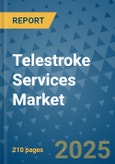Market Insights
Telestroke services are revolutionizing stroke care by enabling timely consultations and diagnostics for patients regardless of location. The growing prevalence of stroke and paralysis worldwide has placed an increased emphasis on remote healthcare solutions that can deliver expert care in critical moments. These services are particularly vital in reducing the risk of stroke-induced cardiac arrests by allowing neurologists to diagnose and treat acute cases without delay.The historical analysis of the market shows a solid foundation of growth, driven by early adoption in technologically advanced regions. As healthcare systems continue to invest in digital infrastructure and clinical innovations, telestroke services are expected to expand into untapped geographies, creating substantial market opportunities.
Market Drivers
A significant driver of market growth is the rising global burden of stroke. Stroke has been identified as one of the leading causes of mortality and long-term disability across the world. As demographics shift and the global population ages, the number of stroke incidents is anticipated to rise sharply, especially in emerging economies where access to specialized care remains limited.Technological advancement is another key catalyst. Innovations in cloud-based platforms, real-time diagnostics, and mobile applications are enhancing the accessibility and efficacy of telestroke programs. These platforms bridge the gap between stroke patients and vascular neurologists, ensuring prompt treatment even in remote or underserved areas. Furthermore, telestroke programs have demonstrated high diagnostic accuracy, improving treatment outcomes and reducing the likelihood of complications.
Favorable reimbursement policies and collaborations between public health institutions and private players are also facilitating the implementation of telestroke services. These partnerships have significantly contributed to successful pilot projects and widespread program deployment in various countries.
Business Opportunities
The global telestroke services market presents numerous growth avenues. Continued expansion of telemedicine into rural and semi-urban locations, especially in developing regions, offers a significant untapped opportunity. The scalability of telestroke services is enhanced by the relatively low cost of deployment compared to traditional stroke care models.New product development and strategic partnerships are anticipated to play a critical role in market expansion. Leading hospitals, research institutions, and telehealth companies are entering collaborations to launch innovative telestroke solutions and improve remote patient monitoring capabilities. Government initiatives to boost digital healthcare infrastructure in countries like India, China, and Australia further create favorable conditions for market entry and expansion.
The increasing use of mobile devices and internet penetration also supports rapid deployment of telestroke programs, enabling real-time video consultations and AI-assisted diagnostics.
Regional Analysis
North America is poised to dominate the telestroke services market over the forecast period. This region benefits from a well-established healthcare infrastructure, widespread awareness about the benefits of telemedicine, and comprehensive reimbursement frameworks. In the United States, stroke continues to be a significant health burden, leading to increased adoption of telestroke services in both urban and rural settings. Ongoing investment in telehealth technologies further supports market expansion.Europe holds a significant share of the market, largely due to favorable government policies and increasing integration of digital health systems. The region's leading healthcare institutions and government bodies are actively promoting telemedicine programs, including telestroke services, to bridge care gaps and improve patient outcomes. The United Kingdom and Germany are at the forefront, implementing national stroke strategies that prioritize timely intervention and remote access to neurology specialists.
Asia Pacific is emerging as a promising market for telestroke services. High stroke prevalence, rising healthcare expenditure, and improved digital infrastructure are key growth drivers in this region. Countries like China and India are witnessing a surge in stroke-related illnesses, creating a strong demand for telehealth services. Government-backed initiatives and increasing public awareness are accelerating the deployment of telestroke programs across major urban centers and rural regions.
Competitive Analysis
The competitive Analysis of the telestroke services market is shaped by innovation, partnerships, and service differentiation. Numerous companies are focusing on developing advanced platforms that offer high-speed consultations, integrated imaging tools, and decision-support systems.Leading players in the market include:
- Access TeleCare, LLC
- TeleSpecialists
- Eagle Telemedicine
- American Well Corporation
- Sevaro Health, Inc.
- T SQRD, Inc (AmplifyMD)
- CEP AMERICA, LLC
- Teladoc Health, Inc.
- Mayo Clinic Health System
- Blue Sky Telehealth
- American TelePhysicians
- The Trustees of the University of Pennsylvania
- UPMC
- Providence
- RapidAI (iSchemaView, Inc)
- Inova
- TeleMed2U
- RemoteICU
- Tryten Technologies, Inc.
Recent developments in the sector include:
- In December 2024, Stony Brook Eastern Long Island Hospital introduced 24/7 Telestroke services in collaboration with Stony Brook University Hospital.
- In September 2024, Royal Philips and the World Stroke Organization launched the Acute Care Policy Brief with proposed interventions to improve outcomes and reduce costs.
Market Segmentation
By Service:
- Consultation Services
- Monitoring Services
- Emergency Services
- Others
By Stroke Type:
- Ischemic Stroke
- Hemorrhagic Stroke
- Transient Ischemic Attack
By Deployment Type:
- Cloud/Web-based
- On-premises
By End-user:
- Hospital & Healthcare Facilities
- Telemedicine Service Providers
- Emergency Medical Services (EMS)
- Others
By Region:
- North America
- Europe
- Asia Pacific
- Latin America
- Middle East & Africa
This product will be delivered within 1-3 business days.
Table of Contents
Companies Mentioned
- Access TeleCare, LLC
- TeleSpecialists
- Eagle Telemedicine
- American Well Corporation
- Sevaro Health, Inc.
- T SQRD, Inc dba AmplifyMD
- CEP AMERICA, LLC
- Teladoc Health, Inc.
- Mayo Clinic Health System
- Blue Sky Telehealth
- American TelePhysicians (ATP)
- The Trustees of the University of Pennsylvania
- UPMC
- Providence
- RapidAI (iSchemaView, Inc)
- Inova
- TeleMed2U
- RemoteICU
- Tryten Technologies, Inc.








